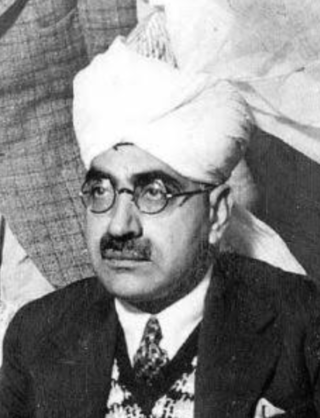Related Research Articles

Khan Bahadur Major Sir Sikandar Hayat Khan,, also written Sikandar Hyat-Khan or Sikandar Hyat Khan, was an Indian politician and statesman from the Punjab who served as the Premier of the Punjab, among other positions.
The 12 May Karachi riots, also known as Black Saturday riots, were a series of violent clashes between rival political activists in Karachi. The violence resulted in 58 killings of ethnic Pashtuns. The unrest began as the recently suspended chief justice Iftikhar Muhammad Chaudhry arrived at the Jinnah International Airport on 12 May 2007. Gunfights and clashes erupted across the provincial capital as lawyers, Pakistan Peoples Party (PPP), Awami National Party (ANP), Pakistan Tehreek-e-Insaf (PTI), and Pashtunkhwa Milli Awami Party (PMAP) activists, who supported the judge, and the pro-government Muttahida Qaumi Movement (MQM) activists took to the streets against each other. Pakistan Muslim League Quaid-e-azam PMLQ and MQM party workers, with support from president and military dictator Gen. Pervez Musharraf, were accused of launching highly coordinated attacks against lawyers, ANP, PTI, PPP, and news channels, especially Aaj News. Government machinery was used to block all major roads. Police was accomplice and a silent spectator to the violence. News media was attacked at Guru Mandir when MQM activists began firing at Aaj News headquarters which was shown on live television.

Salman Taseer was a Pakistani businessman and politician, who served as the 26th Governor of Punjab from 2008 until his assassination in 2011.
Attribution of the 2008 Mumbai attacks were first made by the Indian authorities who said that the Mumbai attacks were directed by Lashkar-e-Taiba militants inside Pakistan. American intelligence agencies also agree with this attribution. Pakistan initially contested this attribution, but agreed this was the case on 7 January 2009. To back up its accusations, the Indian government supplied a dossier to Pakistan's high commission in Delhi. The Pakistan government dismissed the dossier as "not evidence," but also announced that it had detained over a hundred members of Jamaat-ud-Dawa, a charity linked with Lashkar-e-Taiba. In February 2009, Pakistan's Interior Minister Rehman Malik agreed that "some part of the conspiracy" did take place in Pakistan.

The Lawyers' Movement, also known as the Movement for the Restoration of Judiciary or the Black Coat Protests, was the popular mass protest movement initiated by the lawyers of Pakistan in response to the former president and army chief Pervez Musharraf's actions of 9 March 2007 when he unconstitutionally suspended Iftikhar Muhammad Chaudhry as the chief justice of Pakistan's Supreme Court. Following the suspension of the chief justice, the Supreme Court Bar Association (SCBA) declared the judge's removal as an "assault on the independence of judiciary" and was backed by several political parties.

Islamabad Capital Territory Police, also known as Islamabad Police, is a police force formed in 1981 to police Islamabad Capital Territory, Pakistan under administrative control of the Chief Commissioner, Islamabad Capital Territory Administration.

The Pakistan Administrative Service, or PAS is an elite cadre of the Civil Services of Pakistan. The Pakistan Administrative Service over the years has emerged as the most consolidated and developed post-colonial institution in Pakistan, with the PAS officers of Grade 22 often seen as stronger than the federal government ministers. The service of PAS is generalist in nature and officers are assigned to different departments all across Pakistan during the course of their careers. Almost all of the country's highest-profile positions such as the Federal Secretaries, the provincial Chief Secretaries, and chairmen of top-heavy organizations like the National Highway Authority, Trading Corporation of Pakistan and State Life Insurance Corporation usually belong to the Pakistan Administrative Service.
Events in the year 2011 in Pakistan.
In 2009, Pakistan suffered 50 terrorist, insurgent and sectarian-related incidents that killed 180 people and injured 300.
Zamarud Khan is a Pakistani politician who served as the Member of the National Assembly of Pakistan from 2002 to 2007. He also served as MD of Pakistan Bait-ul-Mal from 2008 to 2013. He is known for his involvement in a hostage crisis in Pakistan on 15 August 2013, where he attempted to subdue the hostage-taker. Police used the unplanned distraction to fire at the gunman, which injured him and led to his arrest.
Malik Mumtaz Hussain Qadri, better known as Mumtaz Qadri, was a Pakistani Elite Police commando who is known for murdering Salmaan Taseer, Governor of Punjab. Qadri was a commando of the Elite Police and, at the time of the assassination, a member of the squad of personal bodyguards assigned to protect Taseer. A follower of the Barelvi version of Sunni Islam, he assassinated Taseer on 4 January 2011. He claimed to have killed the Governor because Taseer spoke in defense of Asia Bibi, a Pakistani Christian woman convicted of blasphemy and sentenced to death. Qadri was convicted by the Islamabad High Court, sentenced to death and hanged in February 2016.
Sikandar Sultan Raja is a retired Pakistani civil servant who has been the Chief Election Commissioner of Pakistan since January 2020. Raja belongs to the Pakistan Administrative Service and is batchmates with Rizwan Ahmed, Hussain Asghar, Fawad Hasan Fawad and Jawad Rafique Malik.

Grade-22 is the highest attainable rank for a Civil Servant in Pakistan. Grade 22 is equal to a 4-star rank of the Pakistan Armed Forces. With over five hundred thousand civil servants and bureaucrats in Pakistan, only a few dozen officers serve in BPS-22 grade at a given time. Hence, not even 1% of the country's civil servants and/or bureaucrats make it to the highest rank. Officers serving in BPS-22 grade are largely considered to be the most influential individuals in the country.
Noor Mukadam was a Pakistani victim of murder. She was 27 years old and the daughter of a former diplomat, Shaukat Mukadam. She was murdered at a house in an upscale neighborhood, Sector F-7/4, of Islamabad, on 20 July 2021. Noor was held hostage for two days, tortured with a knuckleduster, then decapitated with a knife. Noor was raped before being murdered.

The Colleyville synagogue hostage crisis was a 2022 incident where a 44-year-old man armed with a pistol took four people hostage in a synagogue in Colleyville, Texas, in the United States.
The 2022 Azadi March II was a protest march led by Imran Khan, former prime minister of Pakistan, from Lahore to Islamabad against the Shehbaz Sharif ministry. It succeeded 2022 Azadi March I, which took place in May.
On 3 November 2022, Imran Khan, a former prime minister of Pakistan and chairman of the Pakistan Tehreek-e-Insaf (PTI) political party, was shot in an attempted assassination in Wazirabad, Punjab, during the 2022 Azadi March II against the Pakistan government. The gunman also injured a number of other PTI leaders and killed a supporter. The attacker's name is Muhammad Naveed and another unidentified gunman was killed.
The events listed below are both anticipated and scheduled for the year 2023 in Pakistan.
References
- ↑ Masood, Salman (2013-08-16). "Pakistani Gunman Is Shot by Police, Ending Standoff in Islamabad". The New York Times. ISSN 0362-4331 . Retrieved 2022-02-26.
- 1 2 3 4 Salman, Masood (15 August 2013). "Pakistani Gunman Is Shot by Police, Ending Standoff in Islamabad". New York Times. Retrieved 11 April 2014.
- 1 2 Khan, Sumera (15 August 2013). "Saga ends: Armed man in Islamabad arrested". The Express Tribune. Retrieved 11 April 2014.
- ↑ "APP Video Preveiw". App.com.pk. 2013-04-24. Archived from the original on 2013-10-16. Retrieved 2014-02-04.
- ↑ "PPP Leader Zamarud Khan | Pakistan Peoples Party Official". Mediacellppp.wordpress.com. 2013-08-16. Retrieved 2014-02-04.
- ↑ "Blue Area Firing Case: Sikander gets 16-year jail". 92 News HD. 2017-05-11. Retrieved 2022-02-26.
- ↑ Jami, Aamir (2017-05-11). "Islamabad standoff: Muhammad Sikander handed 16-year jail sentence and fine". DAWN.COM. Retrieved 2022-02-26.
- ↑ "Islamabad standoff: IHC rejects gunman Sikander's plea seeking suspension of sentence". www.geo.tv. Retrieved 2022-02-26.
- ↑ "Islamabad standoff: Govt changes 9 city SPs". The Express Tribune. 2013-08-19. Retrieved 2022-02-26.